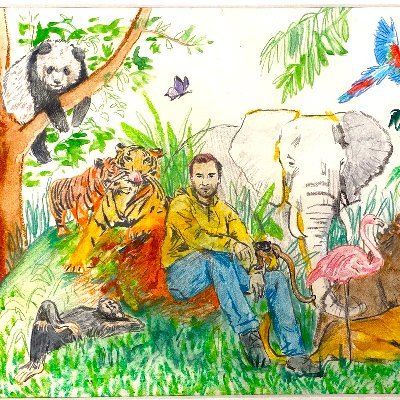
Jie Wang
@JieWang_ZJUI
Followers
1K
Following
5K
Media
285
Statuses
2K
RA@GRASP Lab; @UPenn Prev: @DynaRobotics @IDEACVR @ZJU_China @UIUC; Doing VLAs+Robot Learning; My club: https://t.co/PsXQPPkPpy
Philadelphia, PA
Joined June 2023
If you had access to a robot foundation model, how would you play with it? 🤖 In @GRASPlab , we were fortunate to be early testers of @physical_int Pi0. We found it hard to rigorously benchmark all feasible tasks for a generalist policy. Instead of trying every possible task,
12
20
222
Robot using full size espresso machine? Looks very exciting! I will take a closer look in the technology here
1
0
13
@Ken_Goldberg 6) @GRASPlab will post the recording on YouTube soon, worth your watching! I really appreciate to study at Penn, where I can actively learn from outstanding people from all over the world. Looking forward to seeing next great insights
0
0
3
@Ken_Goldberg 5) Through a series of concrete examples—including robot table tennis, tactile manipulation, quadruped locomotion, and dynamic motor skill learning on anthropomorphic arms—Peters illustrates how inductive biases enable efficient policy search, reinforcement learning, and
1
0
1
4) It’s very aligned with what @Ken_Goldberg ‘s hot take on GOFE in last week’s talk: solid engineering & science still matter. You need system engineering to drive robot learning.
1
0
1
3) The takeaway is simple yet inspiring : Structure × Learning is the most viable path for robotics. We need engineers to inject their inductive biases to deploy models. Unlearn bad behavior is more important than learning all behaviors.
1
0
1
2) His key point: Inductive biases in robotics aren’t formulas, they are choices about what the robot should learn and what it shouldn’t. Examples: • keep policies close to data distribution • smooth + low-gain control • low-stiffness hardware that adapt well to different
1
0
1
1) The quest for intelligent robots capable of learning complex behaviors from limited data hinges critically on the design and integration of inductive biases—structured assumptions that guide learning and generalization. In this talk, Jan Peters explores the foundational role
1
0
1
We are very happy to welcome @Jan_R_Peters at @GRASPlab , UPenn and give a talk on “Inductive Biases for Robot Learning.” After talk, students like me were fortunate to have lunch together. To be honest, at first, I expected heavy math/physics priors, but his message was
1
4
35
Good day starts with good book, which gives you more visionary insights
1
0
11
High quality product review. Love it
I took delivery of a beautiful new shiny HW4 Tesla Model X today, so I immediately took it out for an FSD test drive, a bit like I used to do almost daily for 5 years. Basically... I'm amazed - it drives really, really well, smooth, confident, noticeably better than what I'm used
0
0
4
Good way to use video-generation world model in robotics
🎥 Video Generation Enables Zero-Shot Robotic Manipulation 🤖 Introducing PhysWorld, a framework that bridges video generation and robot learning through (generated) real-to-sim world modeling. 🌐 Project: https://t.co/9mRqPqr5TS 📄 Paper: https://t.co/wmkEpmUGhq 💻 Code:
0
2
4
In my opinion, VLAs research is extremely empirical compared to many other directions. Simulations like LIBERO are no longer statistically meaningful to VLAs, as we can overfit to ~99% easily now. Urgent priorities: 1) Create new sim benchmarks 2) Show real-world experiments
What directions are people exploring when it comes to building foundation models for robots? Vision-Language-Action models have their limitations. Ways we can move past them: - using additional senses and alternate modalities - fine tuning for different downstream tasks like in
14
17
184
Train GPT to predict the next token and latent. We prove this learns beliefs (sufficient statistic for optimal control) and a world model over beliefs. Results in a powerful GPT, with no changes in architecture or inference. Led by @jayden_teoh_ , applying to PhDs this fall.
[LG] Next-Latent Prediction Transformers Learn Compact World Models J Teoh, M Tomar, K Ahn, E S. Hu... [Microsoft Research] (2025) https://t.co/gME1CG7CGq
1
6
20
Just all in robot learning, where you feel passionate and excited to build anything cool, stay tuned on this “underscore” kid from Urbana!
> be me > 9 yrs old > parents want me to go to lego robotics camp > about to throw a fit > realize my best friend is going > change my mind instantly > spend 3 weeks at camp, program NXT (real ones know) robots to “sumo wrestle” > “wow this is so much fun” > do FLL for 3 years >
0
0
2
Generalist Policy for Humanoid!
Humanoids need a single, generalist control policy for all of their physical tasks, not a new one for every new chore or demo. A policy for walking can't dance. A policy for dancing can't support mowing the lawn. We need to scale up humanoid control for diverse behaviors, just
0
0
1
I’m personally much more excited by mobile, bimanual home robots that can quietly handle chores for a family. But it’s hard to ignore that “humanity-as-a-service”, aka, the attention economy, reaches far more people than the hard work to "make robots really work", Many technical
A lot of people seem caught off guard by the sudden switch in robotics from industrial robots (or doing your chores) to dancing and companionship. But here's the thing: AI is already incredibly good at companionship, for a huge number of people, and its only going to get crazier
1
1
11
really cool large datasets maybe the 1st principle data for humanoid foundation policies pre-training, I stay tuned on next crazy work based on it
today, we’re open sourcing the largest egocentric dataset in history. - 10,000 hours - 2,153 factory workers - 1,080,000,000 frames the era of data scaling in robotics is here. (thread)
1
2
15
Hi New York, Hi Columbia! Very insightful conversation with Prof. @YunzhuLiYZ and @YXWangBot , @binghao_huang , excited to see next great work from RoboPIL Lab!
2
4
72











